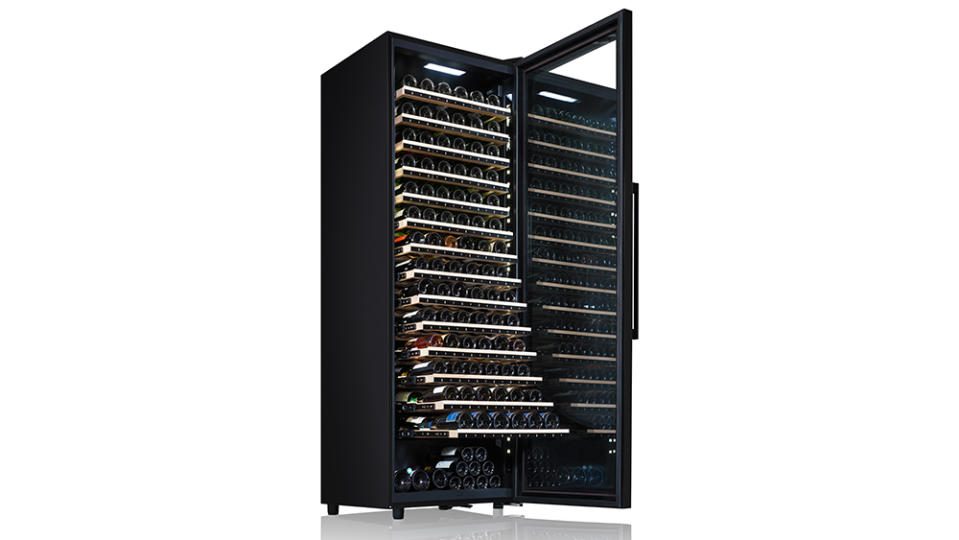How New Tech Is Making Wine Cellars Smarter

Imagine if your entire wine cellar could be delivered to you anywhere, whether you’re shuttling between homes or heading to an office overseas. Sign up for the new service from New York–based start-up Baxus, and your prized bottles are just a few clicks away. The company will store your favorite vintages in one of its temperature-controlled vaults—and create a metaverse-based counterpart for each.
Plug in an NFT-enabled digital frame from Baxus’s partner Metasill and you can summon a 3-D, highly detailed image of your last bottle of 2000 Petrus. Or swipe to view your 1997 Screaming Eagle instead. The frame allows you to show off your cellar anywhere—and minting your own NFTs certifies authenticity and ownership. You can also view your collection, at smaller scale, through the Baxus web app on any smartphone.
More from Robb Report
This $26.5 Million Maya Lin-Designed Apartment Could Become Palm Beach's Most Expensive Penthouse
This Epic $23 Million Massachusetts Mansion Comes With a Vegas-Style Water Park
“So much of collecting is about the flex,” Baxus cofounder Todd Wiesel tells Robb Report with a laugh. “You can show people a picture of a bottle on Instagram 15 times, [but] how do I know it’s yours? This means it’s secure, verified and authenticated.” When you want to show off IRL, the company will ship bottles to you with its own refrigerated trucks locally, or it’ll contract out to a specialist in temperature-controlled ground transport for wine.

Arnaud Derouet
Baxus is just one company aiming for a share of the smart-wine-cellar market, a sector one analyst pegged as likely to pass $1 billion in value within five years. Wiesel has primed his blockchain-bolstered cellaring service for those who want convenient storage and yearn to showcase, rather than stash, their collection. “We scan each bottle individually—these aren’t cartoon or 3-D renders,” he promises. Most wine NFTs can prove only so much, however, such as authenticity but not how, where and at what temperature it’s been stored. Smart thermostats in the Baxus vaults monitor the bottles’ state and confirm their continued presence, creating an unhackable history of each bottle via the blockchain, the ultimate digital provenance.
But there’s one clear downside to this service: The only place you can drink your wine on a whim is in the metaverse. If you’re impulse-prone and prefer to store your collection at home, consider a gadget like Winesor or Sensorist. These devices provide real-time monitoring of humidity and temperature—via Wi-Fi-connected probes that sit amid the bottles—to a smartphone app.
“I was going down [to the cellar] once a week to look at the thermometer and writing that on an Excel sheet, and I thought, ‘There must be a better way of doing this,’ ” says Sensorist inventor Kasper Mejlgaard.
His resulting innovation sits in the same racks as the wine; to activate it, simply fill an empty bottle with water and insert the Sensorist like a cork. The device, which costs around $36, is ideal for assessing how air temperatures in your new wine fridge might vary as the compressor turns on and off. Pair one of his gadgets with a Kelvin K2 Smart Wine thermometer for ultimate reassurance when you’re ready to pop a cork. The device (around $47.50) straps around the neck of any bottle, and an app will ping you when it reaches the ideal temperature.

Courtesy of Sensorist
If you want comprehensive protection, place a pre-order for Frio’s LaSommelière ECellar 185, a French-made smart fridge launching stateside next year. “We all have the same issue: We don’t know what we have, and sometimes we forget a very good bottle—we might even miss the maturity period because we keep it for too long,” says Didier Grychta, the company’s CEO.
His device, which comes with a free subscription to the cellar-logging app Vinotag, provides a real-time update of any bottle added to or taken from its shelves. The 185-bottle cabinet was introduced last summer in Europe and is estimated to cost around $5,000 per unit once the company tweaks it for the American market.
Hopefully, it will prove more successful than past options: WineCab, the company behind WineWall, a $179,000-plus installation with a robot arm programmed to retrieve bottles from a temperature-controlled cabinet, appears, mysteriously, to have gone dormant. Same for Caveasy One, which launched in 2018 as the world’s first high-capacity smart wine rack with space for 1,280 bottles and now doesn’t even have a website. At least once you’ve installed a fridge like ECellar, it can’t disappear. Right?
Best of Robb Report
Sign up for Robb Report's Newsletter. For the latest news, follow us on Facebook, Twitter, and Instagram.

